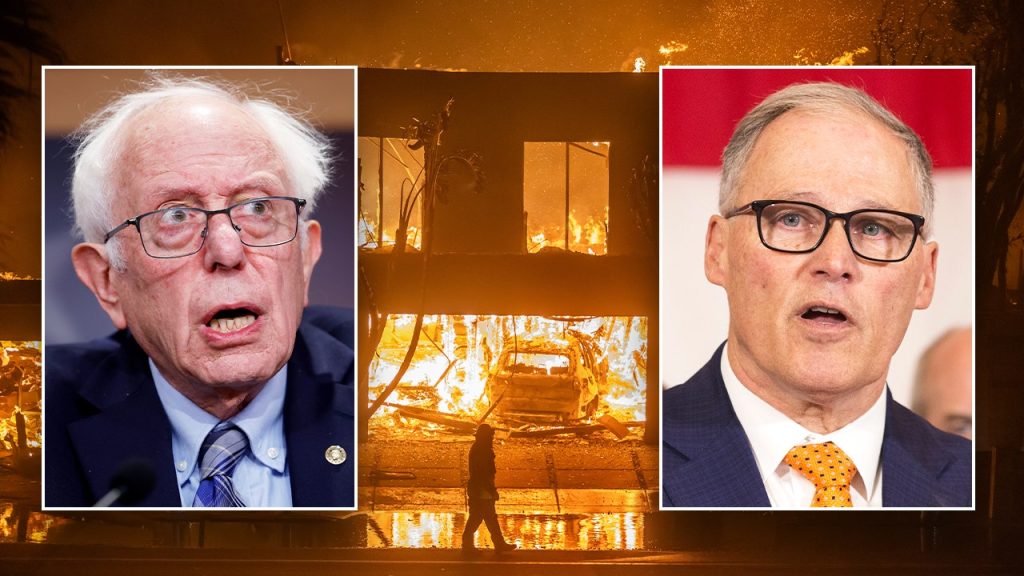The devastating Los Angeles wildfires of early January 2024 ignited a fierce debate about their underlying causes, with Democratic lawmakers largely attributing the disaster to climate change while critics pointed to local policy decisions as contributing factors. The fires, which ripped through the Southern California mountains and quickly spread to coastal residential areas, consumed over 15,000 acres and destroyed thousands of homes, prompting national attention and a flurry of political finger-pointing.
Democratic politicians, including Rep. Dave Min of California, emphasized the role of climate change in exacerbating the fires. They argued that prolonged drought conditions, fueled by a changing climate, had created tinderbox conditions in the region’s vegetation, making it highly susceptible to ignition and rapid spread, especially when combined with strong Santa Ana winds. This narrative gained traction among many, with figures like Senator Bernie Sanders echoing the sentiment and characterizing climate change as an “existential crisis.” Others, like Rep. Jasmine Crockett of Texas, went further, suggesting that elected officials who failed to acknowledge climate change as a primary driver were either ignorant, impotent, or incompetent.
However, a different narrative emerged in the aftermath of the fires, focusing on local preparedness and resource allocation. Reports surfaced that fire hydrants in affected areas had run dry, hampering firefighting efforts, and that the Los Angeles Fire Department’s budget had been recently slashed by millions of dollars. While Governor Gavin Newsom acknowledged these issues and called for an investigation into the Los Angeles Department of Water and Power, the focus of many Democratic lawmakers remained firmly on climate change. Governor Jay Inslee of Washington, for instance, expressed solidarity with Governor Newsom, citing the repeated ravages of climate change in California.
These budgetary decisions, coupled with the reported water shortages, fueled criticism of local officials and raised questions about whether adequate resources had been dedicated to fire prevention and response. Critics, including celebrities like Sara Foster and Khloé Kardashian, expressed outrage on social media, highlighting the juxtaposition of significant tax burdens with seemingly inadequate investment in essential fire safety measures. Foster pointedly criticized the prioritization of programs like syringe exchanges for homeless drug addicts while fire hydrants remained dry and vegetation overgrown. Kardashian directly targeted Mayor Karen Bass, labeling her a “joke” for the city’s apparent lack of preparedness.
Adding another layer to the debate, critics also questioned land management practices. Rick Caruso, a real estate developer and former mayoral candidate, argued that inadequate brush clearance had contributed to the fires’ rapid spread. He suggested that proactive vegetation management could have significantly mitigated the damage, even if the fires themselves couldn’t have been entirely prevented. This perspective highlighted the complex interplay of factors contributing to wildfire risk, including both natural and human-influenced elements.
The Los Angeles wildfires thus became a microcosm of the broader debate surrounding climate change and its impact on natural disasters. While many emphasized the role of climate change in creating drier, more fire-prone conditions, others argued that focusing solely on climate change overlooked critical local policy decisions and resource allocation issues that may have exacerbated the fires’ impact. The debate underscored the need for a multi-faceted approach to wildfire management, encompassing both climate mitigation strategies and proactive local measures such as adequate fire department funding, robust water infrastructure, and effective vegetation management. The fires served as a stark reminder of the devastating consequences of inadequate preparedness and the urgent need for comprehensive strategies to address the growing threat of wildfires in a changing climate.

